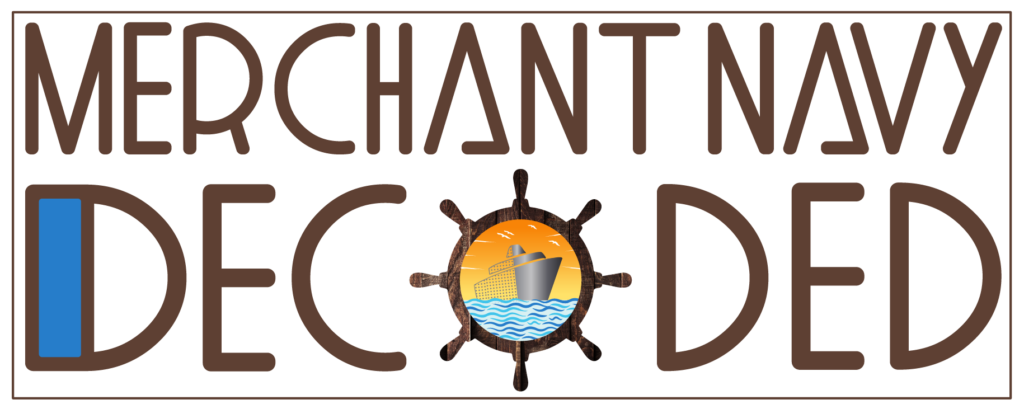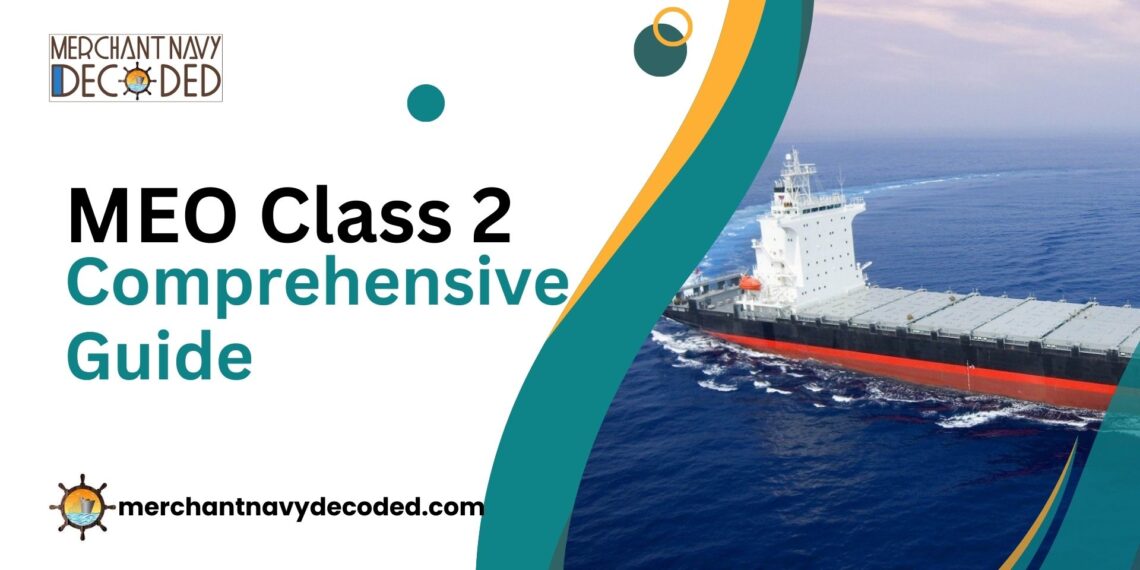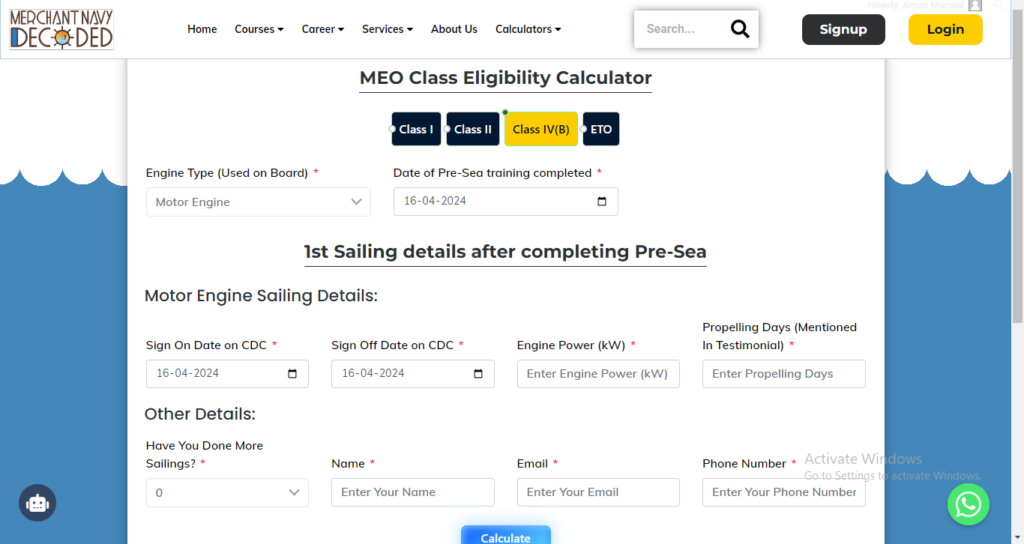MEO Class 2 Eligibility, Syllabus, Documents Required 2024
Table of contents
Overview
MEO Class 2 certification marks a pivotal moment in a maritime professional’s career, opening doors to the role of Second Engineer aboard ships. This promotion brings an increased salary and an elevated reputation within the industry.
The MEO Class 2 examination, aimed at assessing marine engineer’s knowledge and proficiency in marine engineering, is an important step in this process. Success in this exam indicates a readiness for increased responsibility and opportunities on an onboard ship.
Discover everything you need to know about the MEO Class 2 Exam for 2024, including eligibility criteria, syllabus details, and required documents, in our comprehensive blog.
1:- MEO Class 2 Assessment Checklist
| Documents Required | Description |
| Continuous Discharge Certificate (CDC) | Relevant pages show sea service experience. |
| Passport | Copies of the first and last pages. |
| INDoS | Copies of INDOS Certificate in Engineering category |
| MEO class IV CoC | Copy of MEO Class IV coc |
| Original sea service letter issued by the owner of the vessel/RSPL | Original sea service letter issued by the owner of the vessel/RSPL (Addressed to PO, MMD concerned) |
| Sea Service Testimonials | Testimonials from previous employers verifying sea service experience. |
| Preparatory Courses Certificates | Copy of preparatory course |
| Valid Medical Certificate | Valid medical fitness certificate from a DGS-approved doctor |
| Seafarers Profile (Updated) | printout of the seafarer profile to be returned after verification |
| Fees | Total amount: Rs. 11,050/-. Include online fee payment printout. |
2:- STCW Course Required for MEO Class 2
- Copy of Engine Room Simulator Course
- PSCRB and PST refresher
- FPFF and AFF refresher
- PSSR refresher
- SSO or STSDSD
- Medical First Aid Valid within 5 years
2.1:- Booking Procedure
- Submission: Compile all original documents along with photocopies and submit as per requirements.
- Online Fee Payment: Ensure fees are paid online; include payment printout.
- Verification: Documents undergo verification for compliance.
- Booking Confirmation: Confirmation of Part B assessment booking upon successful verification.
Following these steps seriously guarantees a smooth path to MEO Class 2 certification.
3:- MEO Class 2 Eligibility
Here are the eligibility criteria for MEO Class 2 certification:
| Eligibility Criteria | Description |
| Minimum Sailing Experience | Minimum 12 months of approved sailing experience after completion of MEO Class 4. Experience as a watchkeeping engineer on ships with 750KW power or more. |
| Propelling Period | 8 months of the propelling period is required. |
| Sailing Experience Positions | Experience can be as either a 4th Engineer or a 3rd Engineer. |
| MEO Class 2 Preparatory Course | 4 months duration from a DG approved institute. |
| Engine Room Simulator Course | Management Level course from a DG-approved institute. |
| Valid Advanced Level Modular Course Certificates | All advanced-level modular course certificates should be valid at the time of applying for MEO Class 2 exams. |
Discover your eligibility for MEO Class 2 with a click with the help of MEO Class 2 Eligibility Checker by Merchant Navy Decoded
4. MEO Class 2 Functions

To become a Second Engineer, you must first pass a series of essential oral tests called Functions, each of which represents an important component of marine engineering competence.
| Oral/Function | Description |
| FUNCTION 3 – Naval Architecture and Safety | Involves controlling the operation of the ship and caring for persons onboard. |
| FUNCTION 4b – Marine Engineering Knowledge (Motor and General) | Focuses on knowledge related to motor and general marine engineering. |
| FUNCTION 5 – Marine Electro Technology | Covers topics related to marine electro technology, including electrical systems onboard ships. |
| FUNCTION 6 – Marine Engineering Practice | Focuses on practical aspects of marine engineering practice. |
The passing percentage for each oral/function is 60%
5. MEO Class 2 Preparatory Course

You must finish four mandatory advanced courses to be eligible for your MEO Class 2 examination.
- Advanced Fire Fighting
- Proficiency in Survival Craft and Rescue Boats
- Medical First Aid
- Engine Room Simulator training
6. MEO Class 2 Subjects

MEO Class 2 certification is a crucial milestone in a maritime professional’s career, indicating expanded knowledge and preparation for more duties onboard.
Achieving MEO Class 2 certification, which includes tough examinations encompassing a wide range of courses and practical assessments of operational ability, demonstrates a seafarer’s dedication, knowledge, and skill in marine engineering and ship operation.
6.1:- MEO Class 2 Written Subjects:
- Marine Engineering Knowledge (General)
- Marine Engineering Knowledge (Motor)
- Marine Electro Technology
- Marine Engineering Practice
- Naval Architecture
- Ship Safety, Environmental Protection Care
Passing Marks/Percentage: Out of 100 marks, a minimum of 50% is required for passing.
6.2:- MEO Class 2 Oral Subjects (Functions):
- FUNCTION 3 – Naval Architecture and Safety (Controlling the operation of the ship and caring for persons onboard).
- FUNCTION 4b – Marine Engineering Knowledge (Motor and General).
- FUNCTION 5 – Marine Electro Technology
- FUNCTION 6 – Marine Engineering Practice.
Passing Marks/Percentage: Passing percentage is 60%.
7. Documents Required for the MEO Class 2 Exam

Before starting the MEO Class 2 Exam journey, it’s critical to collect and organize the necessary documents for the application procedure:
- Continuous Discharge Certificate (CDC)
- Passport
- INDOS Certificate
- MEO Class IV CoC
- Original Sea Service Letter
- Sea Service Testimonials
- Preparatory Courses Certificates
- Valid Medical Certificate
- Seafarers Profile (Updated)
- Fees
- Original Documents
- Original of STCW Course
- Engine Room Simulator Course
- PSCRB and PST Refresher
- FPFF and AFF Refresher
- PSSR Refresher
- SSO or STSDSD
- Medical First Aid
Know how to pass MEO Class 2 exams easily with the helpful video by Merchant Navy Decoded! Click Here
Conclusion

In conclusion, the process of gaining MEO Class 2 certification consists of several critical procedures, including achieving eligibility criteria, gathering relevant documentation, and successfully passing examinations and assessments.
MEO Class 2 certification is an important milestone in a marine engineering career, providing prospects for progression and expanded duties as a Second Engineer onboard ships.
By carefully complying with the instructions given and thoroughly studying for the examinations, prospective maritime professionals can embark on a rewarding path to attaining MEO Class 2 certification and boosting their careers in the marine business.
FAQ
- What are the eligibility criteria for MEO Class 2 certification?
- Eligibility criteria typically include a minimum sailing experience, completion of preparatory courses, and possession of relevant training certificates.
- What documents are required for the MEO Class 2 exam application?
- Essential documents include a Continuous Discharge Certificate (CDC), Passport copies, MEO Class IV CoC, Sea Service Testimonials, and Medical Fitness Certificate, among others.
- What are the subjects covered in the MEO Class 2 exam?
- The exam covers written subjects such as Marine Engineering Knowledge, Naval Architecture, and Ship Safety, along with oral assessments in areas like Marine Electro Technology and Marine Engineering Practice.
- What is the passing percentage for the MEO Class 2 exam?
- The passing percentage for written subjects is typically 50%, while oral assessments require a passing rate of 60%.
- How can I prepare for the MEO Class 2 exam?
- Preparation involves completing required courses, gathering necessary documents, and studying relevant materials covering marine engineering, naval architecture, and safety protocols.
Disclaimer :- The opinions expressed in this article belong solely to the author and may not necessarily reflect those of Merchant Navy Decoded. We cannot guarantee the accuracy of the information provided and disclaim any responsibility for it. Data and visuals used are sourced from publicly available information and may not be authenticated by any regulatory body. Reviews and comments appearing on our blogs represent the opinions of individuals and do not necessarily reflect the views of Merchant Navy Decoded. We are not responsible for any loss or damage resulting from reliance on these reviews or comments.
Reproduction, copying, sharing, or use of the article or images in any form is strictly prohibited without prior permission from both the author and Merchant Navy Decoded.



